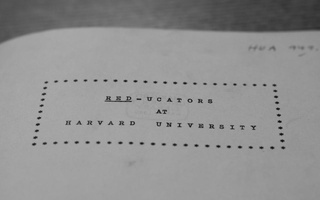(Richard Cornell of the State University of New York at Buffalo delivered a paper at the San Juan Conference on "Students and Politics in the Communist Countries of Eastern Europe." The following is excerpted from the sections of his paper dealing with student attitudes and behavior. --editor's note.)
HOW DO the students themselves respond to the environment in which they find themselves? How do they perceive their own interests and the prospects for their fulfillment? To what extent have the communist regimes in Eastern Europe been successful in instilling their own values in the students?
In the early days after the accession to power by the communists, both in Russia and later in the other countries of Eastern Europe, there appeared to be considerable enthusiasm exhibited by a significant portion, at least, of the younger generation. Although morale among the youth sagged at times, the revolution, the Civil War, and the period of the first Five-Year Plan sparked considerable youthful idealism in Soviet Russia. Whatever enthusiasm had been generated, however, soon wore off by the mid-thirties. Continuous forced effort with little reward, and a stifling of self-expression in the arts and elsewhere after Stalin's consolidation of political control, brought on disillusionment. Furthermore, the harsh measures taken to force the peasants into collective farms had serious repercussions among the youth.
During World War II the patriotic struggle for national defense in the Soviet Union, during which many of the party controls were relaxed, served to rally young people to the cause of the party. In this period, the identification by the party of their actions with the interests of the entire society found wide acceptance. The prominent role played by the communists in the underground resistance movements in the German-occuppied, or German-allied, countries of Eastern Europe during World War II contributed considerably to their popularity in 1945. A number of developments after the war, however, led to a return of disillusionment in the Soviet Union, and the beginning of disillusionment in the new communist states in Eastern Europe--unrest caused by opportunities for young Soviet soldiers to observe life in the West, the disappointment of many at the failure of the Soviet regime to continue its relaxation of the extensive pre-war controls, and the failure of the communists in Eastern Europe to provide a free, democratic alternative to the pre-war authoritairian regimes.
Young professional people, with the writers in the vanguard, have been increasingly critical of restrictions imposed by the system on free expression and the free exchange of ideas. Young writers have been the leaders of the protests against the dogmatic approach to life that is so characteristic of the communist regimes. On a broader scale, the large mass of young people, who are neither products of the higher educational system nor young intellectuals, are equally disillusioned. Although their horizons are not so high as to push them into protests and demands for more selfexpression, they do have their own means of expressing discontent.
The failure of students, young intellectuals, and youth in general to identify completely their interests with the policies of the communist party is one of the most important facts of life in a communist country. One need only read the continuing complaints of the regimes in the party presses to become aware of this. This condition is a direct consequence of the environment imposed on these groups by the parties, an environment through which little prospect is seen of fulfilling individual interests. It had led to a response by these groups to their environment which has a distinctly political character.
Student attitudes, as distinct from the behavior to which these attitudes lead, are extremely difficult to ascertain in a communist country. Limited survey research in Poland, the U.S.S.R., and elsewhere, however, along with the impressions of those outsiders who have lived among students in a communist society, have provided some direct evidence of student attitudes.
Those attitudes which have the most relevance for student political activity reflect quite strongly the failure of the communist regimes to make much progress in building the "new socialist man." Strongest evidence for this comes from surveys made in 1958 and 1961 on the world outlook of Warsaw students. These surveys indicated changes over this period in attitudes towards religion, socialism, and ideological, social, or political involvement.
Firstly, they did show a decrease in the acceptance of the moral principles of Roman Catholicism as the best guide in life. This could be taken to indicate some success in the Party's efforts at eradication of old values and the instilling of new. Other evidence contrary to this trend, however, shows that in Czechoslovakia, for example, "the students have a tendency to derive general moral rules from religious ethics or from bourgeois humanism, and to apply them as criteria for history ..." at the expense of "communist morality."
Robin Hood vs Marx
Further indications of the failure of the communist regimes to develop "communist morality," and inculcate communist-defined "ideal types," can be seen in the results of a survey of Hungarian school children. The majority chose the "bourgeois" hero Robin Hood over both Marx and Lenin when responding to questions concerning figures perceived as heroic types. When asked why, the children cited the qualities of bravery, honesty, and loyalty--not the most important of the behavior traits which communist regimes seek to instill in its young citizens. Only 9.5 percent of the school children chose "heroes of the workers' movement" as their ideal. Interestingly, the results of a poll in Poland conducted among students at the Cracow Metallurgy and Mining Academy showed a majority choosing John F. Kennedy as their idol. He was followed by Yuri Garagin, De Gaulle, Pope John XXIII, and then Karl Marx.
The Polish surveys of 1958 and 1961 showed also a rise in the acceptance of some form of socialism--a socialism, however, which tended implicitly to be identified with certain economic and social welfare programs associated with Western social democracy (state ownership of industry, free medical care). Much less evident was an identification of socialism, as actual economic and social programs, with Marxism-Leninism; rather, Marxism-Leninism was identified with ideology. Yugoslav surveys in 1960 and 1965 indicate that in each case about three-fourths of the sample ex- pressed a "completely positive or partly positive attitude towards the fundamental elements of the system." No information was given, however, with respect to what constituted the "fundamental elements of the system" (i.e., a definition of socialism). The communist regimes will continue to have problems building a new mode of thinking, in creating the "new socialist man" so long as they fail to develop in the younger generation a belief in Marxism Leninism as a living doctrine. They will fail to the extent they are unsuccessful in developing in the minds of young people an identity between Marxism-Leninism as an image of an ideal society, and Marxism-Leninism as a cumulative body of practice.
Risk Your Life for An Ideology?
The regimes want acceptance of party policies, and commitments to carrying them out. The Polish surveys, as well as other evidence, however, show that young people are increasingly less committed to sacrificial, revolutionary programs. Sixty-eight percent of the 1958 survey respondents said they did not think one should risk one's life for a social ideology. Young people appear by no means inspired to support grand schemes for construction of radically new societies. Their real concern is for more opportunity for self-expression, for the satisfaction of personal goals and wants.
In the much-discussed poll taken in the Soviet Union in 1961 by the official newspaper of the youth organization, Komsomolskaya Pravda, 96.7 percent of those returning questionnaires indicated that they had a personal goal in life. Only 14.9 percent, however, said that they wished to become "real communists." Most were concerned with their own personal development--with becoming a specialist, "with achieving something outstanding," and the like. Concern for the development of the individual personality, and with freedom of thought so as to find the "truth" showed up quite clearly in this survey.
Read more in News
Teaching Prize Nominees SoughtRecommended Articles
-
Show BusinessOne is justified in reacting with suspicion to the Defense Department's announcement that it is putting out a new film
-
Rewolucja: 20 Years LaterOn this day two decades ago, Polish patriots took on the world’s largest army and succeeded beyond their wildest dreams,
-
Mr. Bowman, Tear Down this WallOn the fateful day of the Harvard-Yale football game, most would expect to see Undergraduate Council President Johnny F. Bowman ...
-
 FM Investigates: The Kremlin on the Charles
FM Investigates: The Kremlin on the Charles -
 Even When No One is Looking
Even When No One is Looking -
 New Accusations of Communism at Harvard
New Accusations of Communism at Harvard













